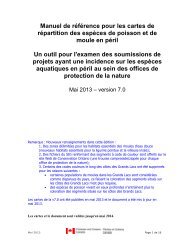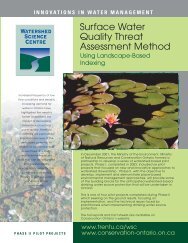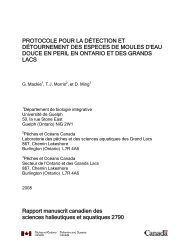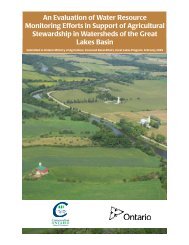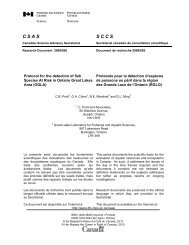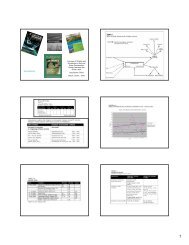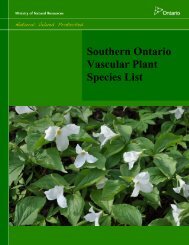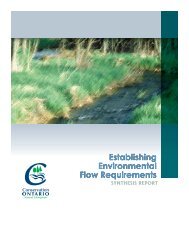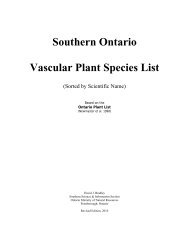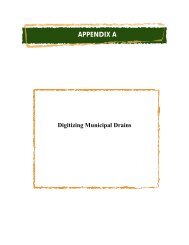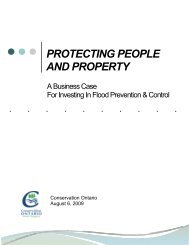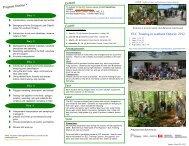Download the Flyer - Conservation Ontario
Download the Flyer - Conservation Ontario
Download the Flyer - Conservation Ontario
Create successful ePaper yourself
Turn your PDF publications into a flip-book with our unique Google optimized e-Paper software.
Program Outline *<br />
Day 1<br />
Introductions, course objectives and outline<br />
Background to <strong>the</strong> Ecological Land Classification<br />
for sou<strong>the</strong>rn <strong>Ontario</strong><br />
Introduction to site and substrates, observe<br />
catena in field<br />
Day 2<br />
Distinguishing substrate materials, substrate<br />
description and sampling<br />
Describing substrates in <strong>the</strong> field: substrate<br />
pits and augers<br />
Air photo interpretation<br />
Day 3<br />
Introduction to plant community description,<br />
sampling and classification<br />
Using <strong>the</strong> ELC tools: keys, community tables,<br />
data cards<br />
Using related tools: forestry techniques,<br />
prisms, field cruising, tally records<br />
Day 4<br />
Polygon sampling, description, and classification<br />
Putting it all toge<strong>the</strong>r in <strong>the</strong> field: polygon<br />
location, sampling, site and substrate description<br />
and vegetation sampling, in field<br />
Day 5<br />
Independent interpretation and sampling of<br />
2 polygons<br />
prepare and write up summaries for polygons<br />
Group presentations of results, and testing<br />
Review and wrap-up<br />
*Note: <strong>the</strong> entire 5 day agenda for <strong>the</strong> ELC course can be downloaded<br />
from: .<br />
http://www.conservationontario.ca/events_workshops/ELC_portal/inde<br />
x.html<br />
Contact<br />
To register for <strong>the</strong> ELC course, please contact Harold Lee<br />
(OMNR): harold.lee@ontario.ca<br />
659 Exeter Road, London, <strong>Ontario</strong>, N6E 1L3<br />
519-873-4629 (Phone), 519-873-4645 (Fax)<br />
http://www.conservationontario.ca/events_workshops/ELC_portal/index.html<br />
Courses<br />
2013 Course Schedule<br />
1. May 27- 31 @ Kawartha <strong>Conservation</strong>, Lindsay, ON<br />
2. June 10 - 14 @ Ferguson Forest Centre, Kemptville, ON<br />
3. July 8 - 12 @ Kawartha <strong>Conservation</strong>, Lindsay, ON<br />
4. September 16 - 20 @ Bird Studies Canada, Turkey Point, ON<br />
Arrange‐<br />
Accommodations:<br />
Students will have to make <strong>the</strong>ir own arrangements for accommodations.<br />
There is a list of hotels and motels available on <strong>the</strong> web<br />
site<br />
Meals:<br />
Students will be provided lunches each day, which may include<br />
“bag” lunches. Students are responsible for <strong>the</strong>ir own Breakfasts<br />
and Dinners, except during night sessions. Students with special<br />
dietary needs should contact us, and we will accommodate as<br />
much as we can.<br />
Transportation:<br />
Please car-pool as much as possible. We will be looking for people<br />
to volunteer to help drive, and keep number of vehicles down at<br />
field sites.<br />
Fees<br />
Each student will be charged $750, to cover lunches, equipment,<br />
and o<strong>the</strong>r costs to run <strong>the</strong> course.<br />
Gear<br />
The ELC course is primarily an outdoor field course, designed to<br />
give students field skills. Students are responsible for bringing all<br />
<strong>the</strong>ir own “gear”, which include <strong>the</strong> following:<br />
rain jacket and pants, warm outdoor gear (e.g. hat), water bottle,<br />
boots (also rubber boots), bug spray, backpack, map / data card<br />
bag (zip lock), field guides (e.g. plant ID guides), camera, binoculars.<br />
Note<br />
Please Note:<br />
All sampling equipment used during <strong>the</strong> course, will be supplied by<br />
MNR. Both <strong>the</strong> ELC Field Guide (First Approx) + ELC Training<br />
Manual are now out of print.<br />
Go to web site to get digital copies of ELC manuals. Use this web<br />
site for information on ELC Training Courses , <strong>the</strong> agenda, contacts,<br />
and o<strong>the</strong>r resources, like species lists, and ELC tables.<br />
OMNR - Sou<strong>the</strong>rn Science and Information Section presents<br />
E��������� L��� C������������� P������ ��� O������<br />
ELC Training in sou<strong>the</strong>rn <strong>Ontario</strong>: 2013<br />
1. May 27 to 31<br />
2. June 10 to 14<br />
3. July 8 to 12<br />
4. September 16 to 20<br />
Prepared and delivered by:<br />
OMNR + OMAFRA<br />
Version: Nov 15, 2013
OMNR sponsored<br />
There is a need for consistent and standardized natural heritage<br />
information and mapping among <strong>the</strong> many planning authorities<br />
and <strong>the</strong>ir partner organizations, across sou<strong>the</strong>rn <strong>Ontario</strong>.<br />
To address issues concerning wetlands, species at risk,<br />
and resource management and planning, field data is often<br />
collected. Broad scale modeling, mapping, and interpretation<br />
initiatives also require field samples to verify and confirm ecosystem<br />
types, boundaries, and descriptions. Ultimately, this<br />
field sampling provides <strong>the</strong> information needed to make planning<br />
and management decisions. Our goal is to deliver <strong>the</strong><br />
training requested by resource professionals, to describe,<br />
identify, name and map ecological communities, according to<br />
ELC.<br />
The Ecological Land Classification Training Course has been<br />
delivered across sou<strong>the</strong>rn <strong>Ontario</strong> for 13 years now. It has<br />
come to be respected amongst resource managers and planners,<br />
and is required by many agencies as a jobs prerequisite.<br />
The ELC Training Course is an intensive, 5-day field course<br />
designed to provide hands-on experience in applying basic<br />
field skills, along with <strong>the</strong> specialized techniques required by<br />
<strong>the</strong> ELC system.<br />
The Ministry of Natural Resources collaborates with Agriculture<br />
Canada, <strong>Ontario</strong> Ministry of Agriculture, Food, and Rural<br />
Affairs to present this course. Students find <strong>the</strong> wide range of<br />
expertise and talents amongst <strong>the</strong> teachers to be engaging,<br />
relevant, and able to address most of <strong>the</strong>ir questions.<br />
Each student receives a certificate, provided <strong>the</strong>y have met<br />
<strong>the</strong> attendance, skill level, and evaluation requirements.<br />
*Note: <strong>the</strong> “OMNR sponsored ELC Training Courses “ are <strong>the</strong> only<br />
accepted standard for ELC training in <strong>Ontario</strong>.<br />
Field Skills<br />
The ELC Training Course provides <strong>the</strong> students<br />
with <strong>the</strong> necessary basic field skills to<br />
describe, classify and map ecosystems.<br />
Most of <strong>the</strong> course (5 days) is taken up<br />
learning how to read landscapes, and to<br />
describe sites, substrates and vegetation.<br />
These basic skills are <strong>the</strong>n applied to implement<br />
<strong>the</strong> ELC data collection protocols and<br />
interpret <strong>the</strong>ir field data to classify and name<br />
Vegetation Types and Substrate Types.<br />
The majority of <strong>the</strong> course emphasizes basic field skills, that<br />
remain relatively consistent from year to year. Skills learned<br />
at older ELC courses remain relevant today, and will remain<br />
relevant in <strong>the</strong> future. Advances and changes in <strong>the</strong> ELC<br />
classification system and products will be integrated into <strong>the</strong><br />
curriculum when appropriate and timely. Implementation of<br />
“new” ELC products and training begins spring of 2010. All<br />
basic field skills and techniques taught in 2009 will remain<br />
relevant in 2010.<br />
The OMNR sponsors training courses to facilitate <strong>the</strong> application<br />
of ELC in <strong>the</strong> field and interpretation of data. The<br />
goal of <strong>the</strong> training course is to provide a practical opportunity<br />
for participants to acquire skills in <strong>the</strong> application and<br />
interpretation of ELC in sou<strong>the</strong>rn <strong>Ontario</strong>. Skills instruction<br />
will include:<br />
�� surficial geology interpretation<br />
�� substrate sampling, description and classification<br />
�� delineation of vegetation communities and mapping<br />
�� vegetation inventory and forest cruising techniques<br />
and<br />
�� data interpretation and application<br />
Instructors<br />
The ELC course will be led by an experienced complement of professionals<br />
from <strong>Ontario</strong> Ministries of Natural Resources, Agriculture, Food and<br />
Rural Affairs, Agriculture Canada, <strong>Conservation</strong> Authorities, and consultants.<br />
This diverse and qualified group contribute <strong>the</strong>ir expertise in pedology,<br />
ecology, botany, forestry, mapping, land use planning, and teaching to<br />
make <strong>the</strong> training materials comprehensive and robust.<br />
Harold Lee, B.Sc., M.Sc. (Plant Ecology)<br />
Harold is with <strong>the</strong> Information Management & Spatial Analysis Unit, with<br />
OMNR, and has been <strong>the</strong> lead ecologist on <strong>the</strong> Sou<strong>the</strong>rn <strong>Ontario</strong> Ecological<br />
Land Classification program since 1992. Harold is <strong>the</strong> principal developer<br />
and author of sou<strong>the</strong>rn ELC products and provides, with his plant<br />
ecology and soils background, <strong>the</strong> direct link to <strong>the</strong> ELC program at <strong>the</strong><br />
training courses.<br />
Eric Wilson, B.Sc. (Pedologist)<br />
Eric is now a consulting Pedologist, who spent more than 30 years with<br />
OMFRA as a soil specialist. Eric has long been involved with many of <strong>the</strong><br />
regional soil surveys, and was instrumental in pulling toge<strong>the</strong>r soils information<br />
across <strong>Ontario</strong>, with Soils <strong>Ontario</strong>. Eric has helped teach soils at<br />
<strong>the</strong> ELC courses for more than 10 years now.<br />
David Kroetsch, M.Sc., P.Ag. (Pedologist)<br />
David is a pedologist and soil specialist with Agriculture and Agri-Food<br />
Canada specializing in soil survey upgrades and research on soil resurvey<br />
techniques using digital information and <strong>the</strong> spatial and temporal<br />
change in soil and landscape attribute information in <strong>Ontario</strong>. Dave has<br />
helped teach soils at <strong>the</strong> ELC courses for more than 10 years.<br />
Shaun Thompson, B.Sc. (Biology)<br />
Shaun has been <strong>the</strong> District Ecologist with <strong>the</strong> Kemptville District OMNR<br />
for 18 years, with experience in Fish and Wildlife management for an<br />
additional 11 years. Much of his work focuses on wetland evaluation and<br />
wetland ecology, species at risk and natural heritage areas and systems.<br />
Shaun has recently been working with o<strong>the</strong>rs using ELC based data in<br />
developing predictive habitat models for species at risk.<br />
Albert Garofalo (Consulting Ecologist)<br />
Albert is an ecologist, with over ten years of experience working for various<br />
conservation authorities, and OMNR. Albert has extensive experience<br />
applying <strong>the</strong> ELC to natural areas inventories, along with wetland<br />
evaluations.<br />
Adam Hogg (OMNR: Remote Sensing Specialist)<br />
Adam is a Remote Sensing Specialist with <strong>the</strong> Inventory, Monitoring and<br />
Assessment Section, with OMNR. With over 10 years of leading remote<br />
sensing projects and developing methods for ecological mapping, Adam<br />
has contributed to some key resource inventory tools across <strong>the</strong> province,<br />
including Sou<strong>the</strong>rn <strong>Ontario</strong> Land Resource Information System (SOLRIS),<br />
Far North Land Cover and Disturbance mapping and has coordinated<br />
ELC <strong>the</strong>med remote sensing / field based courses.<br />
Joel Mostoway (OMNR: Remote Sensing Specialist)<br />
Joel is a Remote Sensing Analyst with <strong>the</strong> Inventory, Monitoring and<br />
Assessment Section with OMNR. Joel has over 10 years experience<br />
contributing to <strong>the</strong> development of many land cover products. These<br />
include: Sou<strong>the</strong>rn <strong>Ontario</strong> Land Resources Information System (SOLRIS),<br />
Far North Land Cover and <strong>the</strong> International Land Cover Mapping for<br />
Nor<strong>the</strong>rn Border Security. In <strong>the</strong> past year, Joel has participated in <strong>the</strong><br />
ELC course by leading <strong>the</strong> geomatics component.<br />
Brenda Van Ryswyk (Natural Heritage Ecologist, <strong>Conservation</strong> Halton)<br />
Brenda is an Ecologist with <strong>Conservation</strong> Halton, applying ELC and Air<br />
Photo Interpretation skills over <strong>the</strong> past 6 years to develop <strong>the</strong>ir Natural<br />
Areas Inventory. Brenda specializes in ELC application, plant inventories,<br />
salamander monitoring, and odonata and butterfly inventories. Brenda is<br />
an active member of <strong>the</strong> ELC Technical Committee in sou<strong>the</strong>rn <strong>Ontario</strong>,<br />
overseeing <strong>the</strong> development and implementation of <strong>the</strong> new ELC.<br />
Linda Touzin, RPF (OMNR: District Forester)<br />
Linda Touzin has been a Forester with OMNR, Kemptville District, for<br />
over 20 years. Linda has helped with <strong>the</strong> field portion of <strong>the</strong> ELC Course<br />
since 2010 where she shares her knowledge of forest mensuration and<br />
forest management in sou<strong>the</strong>rn <strong>Ontario</strong>.



